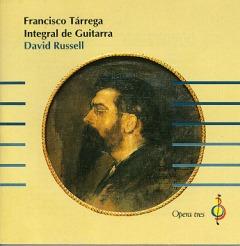Francisco Tárrega - Integral de Guitarra (David Russell) [1991]
Francisco Tárrega - Integral de Guitarra (David Russell) [1991]

CD1: 1- Maria (Gavota) 2- Pavana 3- Gran Vals 4- El columpio 5- Vals (en re) 6- Danza Mora 7- Danza Odalisca 8- Pepita (Polka) 9- Rosita (Polka) 10- Dueńa (Mazurka) 11- Marieta (Mazurka) 12- Mazurka (En sol) 13- Adelita (Mazurka) 14- Las dos hermanitas (Vals) 15- Minueto 16- Paquito (Vals en do) 17- Isabel (Vals) 18- Sueńo (Tremolo) 19- Fantasia sobre motivos de la Traviata (Verdi) 20- Fantasia de Marina 21- El Carnaval de Venecia CD2: 1- Capricho Arabe 2- Recuerdos de la alhambra 3- Alborada 4- Tango Preludios 5- En Mi 6- En La 7- En Lam 8- En Sim 9- En Sol 10- En Rem 11- En Sol 12- En Mi (Lagrima) 13- En Rem (Endecha) 14- En Rem (Oremus) 15- En Re 16- En Re 17- En Mi 18- En Lam 19- En Lam 20- En Mi Estudios 21- En forma de Minueto 22- De Velocidad 23- En Sol 24- En Sim 25- En La 26- En La 27- En La 28- En Lam 29- En Mi 30- Petit Menuet 31- En Re 32- En Do 33- En La 34- La mariposa 35- Sobre un tema de Wagner 36- Inspirado en J.B Cramer 37- Sobre un tema de Mendelsson 38- En La 39- En Mim 40- Estudio Brillante de Alard 41- Gran Jota David Russel - Guitar
"More than any other guitarist, David Russell understands the art of musical mouth-to-mouth resuscitation. He can breathe new life into an innocent little piece that most of us gave up playing years, decades, even generations ago. Some of Tarrega's pieces come into that category. Russell lavishes his battery of skills on every innocuous phrase, every mundane harmonic progression, as if his life as well as Tarrega's reputation depended on it. It is not sleight of hand - it's all in the music, if you care to look. Boring performances of Tarrega are the fault of the player, not the composer. (...) a definitive version of his guitar compositions recorded by a master engineer (John Taylor) and performed by, simply, the best man for the job." ---Colin Cooper, davidrussellguitar.com
Francisco Tárrega was an important Spanish composer whose music and style of guitar playing became strongly influential in the twentieth century. He was central to reviving the guitar as a solo instrument in recital and concerts. Among his most popular compositions are Recuerdos de la Alhambra and Danza mora. He wrote nearly eighty original works for the guitar and over a hundred transcriptions, mostly of piano pieces by Chopin, Beethoven, and others.
Francisco Tárrega was born on November 21, 1852, in Villareal, Castellon, Spain. An accident in his early childhood permanently impaired his eyesight. He was taught his first lessons on guitar by Eugeni Ruiz, ironically a blind musician. In 1862, concert guitarist Julian Arcas, on tour in Castellon, heard young Francisco play and advised Tárrega's father to allow Francisco to come to Barcelona for study with him. Tárrega's father agreed, but insisted that he take piano lessons as well. His father was well aware that the guitar, as a solo vehicle, was in decline, coming increasingly to be viewed as an instrument to accompany singers, while the piano was all the rage throughout Europe.
By his early teens, Tárrega had become proficient on both instruments. For a time, he played with other musicians at local engagements to earn money, but eventually he returned home. In 1874 he enrolled at the Madrid Conservatory where he would study composition under Arrieta. He had brought along with him a recently-purchased guitar, made in Seville by Antonio Torres. Its superior sonic qualities inspired him both in his playing and in his view of the instrument's compositional potential. When Arrieta heard his student Tárrega in a guitar concert, he convinced him to focus on guitar and abandon ideas of a career involving the piano.
In about 1876, Tárrega began teaching and giving regular guitar concerts. He typically received much acclaim for his playing and began traveling to other areas of Spain to perform. By this time he was composing his first works for guitar. In 1880, he met his future wife, Maria Rizo, when he was giving a concert in Novelda. That same year he went on tour to Lyon, Paris, and London, now playing his own works in addition to those of other composers.
In 1881, he and Maria were married in Novelda. He soon began transcribing piano works of Beethoven, Chopin, Mendelssohn, and others to enlarge his guitar repertory, and, no doubt, to make use of his considerable knowledge of keyboard music. Tárrega and his wife moved to Madrid, but after the death of an infant daughter, Maria Josefa, they settled permanently in Barcelona in 1885.
On a concert tour in Valencia shortly afterward, Tárrega met a wealthy widow, Conxa Martinez, who became a valuable patron to him. She allowed him and his family use of a house in Barcelona, where he would write the bulk of his most popular works, including Recuerdos de la Alhambra. From the latter 1880s up to 1903, Tárrega continued composing, but limited his concerts to Spain. In about 1902, he cut his fingernails and created a sound that would become typical of those guitarists associated with his school. The following year he launched a tour of Italy, giving highly successful concerts in Rome, Naples, and Milan.
In January 1906, he was afflicted with paralysis on his right side, and though he would eventually return to the concert stage, he never completely recovered. He finished his last work, Oremus, on December 2, 1909. He died 13 days later. ---Robert Cummings, Rovi
download: uploaded yandex 4shared mediafire solidfiles mega zalivalka filecloudio anonfiles oboom
Zmieniony (Środa, 28 Maj 2014 11:30)








